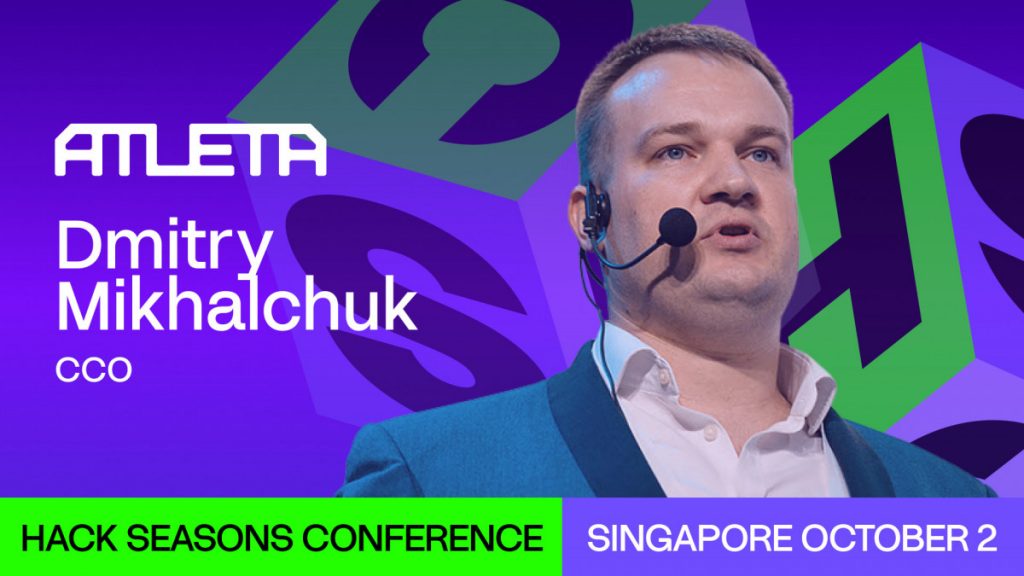Atleta Is Turning Sports Into a Transparent, Tokenized Ecosystem


In Brief
Atleta, a recently launched multichain network, aims to enhance transparency and accessibility in sports by tokenizing sports assets.

When Dmitry “Dima” Mikhalchuk talks about Atleta, his energy feels contagious — not the rehearsed kind you hear from executives, but the grounded excitement of someone who’s seen his idea grow from a charity project into a global sports-tech movement.
Atleta Network, a new layer-1 blockchain launched just a few weeks ago, was built with one goal: to bring transparency, accessibility, and real-world utility to the world of sports. “Atleta is designed to support and help tokenize sports assets,” Dima explains. “It’s EVM-compatible and acts as a data oracle — collecting stats on athletes and providing verified information to the public.”
From Charity to a Global Sports-Tech Vision
What makes the story even more compelling is its unexpected beginning. “It all started with charity,” Dima says. During the pandemic, his team was providing food to underserved communities in India, then moved to Africa to dig wells. “We saw all these kids playing football with passion, even in the toughest conditions. We started bringing footballs, and one thing led to another.”
That “other” turned out to be a massive pivot. After building three stadiums in Brazilian favelas and launching their own academy, fundraising challenges inspired a bigger idea. “We realized we could apply our tech knowledge to make it easier for people to support kids and grassroots sports directly,” Dima recalls. “That’s how Atleta was born.”
Building the Future of Sports Ecosystems
Atleta tackles one of the biggest issues in modern sports — trust. Global fandom doesn’t always translate to transparent financial support. “Manchester United, for example, has more fans outside the UK than inside,” he notes. “Imagine if they could safely and legally support their club for the next transfer window. That’s what we’re building — a system with clear on- and off-ramps, verified transactions, and legal compliance.”
But Atleta’s ambitions stretch beyond fan engagement. The team is building a full sports-data infrastructure powered by blockchain and AI. “We’ve integrated computer vision to collect near real-time performance data from athletes,” says Dima. “That’s what makes us a true oracle for sports — delivering verified, transparent data to clubs, federations, and fans.”
The company’s network already spans more than 12 regions, from Brazil to Japan, and its partnerships include major clubs, academies, and even ministries of sport. While football remains the flagship focus, Atleta’s reach extends to motorsports, with plans to launch a global drifting championship — a missing piece in the racing world that Dima believes has huge potential.
Perhaps the most anticipated piece of the ecosystem is the Blockchain Sports Arena, set to launch this October. “It’s not just a liquidity platform for sports entities,” Dima explains. “It’s also a gamified experience. We’re giving fans a place to engage, compete, and have their voices heard.” The idea, he adds with a grin, was partly born from frustration: “FIFA made it almost impossible to express that raw adrenaline in the streets — so we thought, let’s do it online, safely and legally.”
What sets Atleta apart is its rejection of the traditional “fan token” model that flooded Web3 sports over the past few years. “Fan tokens are a one-way street,” says Dima. “We’re building a two-way bridge — or even better, a highway — connecting finance, support, data, and analytics. It’s real utility, not speculation.”
That vision comes to life through the company’s grassroots work in Brazil. The Atleta academies already train around 500 children, with some pre-signed by professional clubs. “We wanted to create a state-of-the-art environment that gives real opportunities to young players,” Dima says. “It’s about future champions, but also about giving kids hope and structure.”
Looking ahead, Atleta’s roadmap is ambitious. Over the next year, the team plans to onboard at least 50 professional clubs, bringing thousands of academies into its ecosystem. “We’re already talking directly with leagues,” Dima says. “Once a few major names join, the rest will follow. This is just the beginning.”
With its mix of social purpose, technological sophistication, and global reach, Atleta feels less like another blockchain startup — and more like a blueprint for how Web3 can reshape entire industries from the ground up.
As Dima puts it, “We started by bringing footballs to kids in need. Now we’re building the infrastructure to connect the entire sports world — transparently, fairly, and for everyone.”
Disclaimer
In line with the Trust Project guidelines, please note that the information provided on this page is not intended to be and should not be interpreted as legal, tax, investment, financial, or any other form of advice. It is important to only invest what you can afford to lose and to seek independent financial advice if you have any doubts. For further information, we suggest referring to the terms and conditions as well as the help and support pages provided by the issuer or advertiser. MetaversePost is committed to accurate, unbiased reporting, but market conditions are subject to change without notice.
About The Author
Victoria is a writer on a variety of technology topics including Web3.0, AI and cryptocurrencies. Her extensive experience allows her to write insightful articles for the wider audience.
More articles

Victoria is a writer on a variety of technology topics including Web3.0, AI and cryptocurrencies. Her extensive experience allows her to write insightful articles for the wider audience.


















































